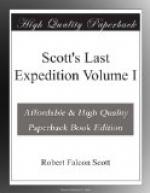The Corner Camp. [Bearings: Obs. Hill < Bluff 86 deg.; Obs. Hill < Knoll 80 1/2 deg.; Mt. Terror N. 4 W.; Obs. Hill N. 69 W.]
Saturday, February 4, 8 A.M., 1911.—Camp 6. A satisfactory night march covering 10 miles and some hundreds of yards.
Roused party at 10, when it was blowing quite hard from the S.E., with temperature below zero. It looked as though we should have a pretty cold start, but by the end of breakfast the wind had dropped and the sun shone forth.
Started on a bad surface—ponies plunging a good deal for 2 miles or so, Bowers’ ‘Uncle Bill’ walking steadily on his snow-shoes. After this the surface improved and the marching became steadier. We camped for lunch after 5 miles. Going still better in the afternoon, except that we crossed several crevasses. Oates’ pony dropped his legs into two of these and sank into one—oddly the other ponies escaped and we were the last. Some 2 miles from our present position the cracks appeared to cease, and in the last march we have got on to quite a hard surface on which the ponies drag their loads with great ease. This part seems to be swept by the winds which so continually sweep round Cape Crozier, and therefore it is doubtful if it extends far to the south, but for the present the going should be good. Had bright moonshine for the march, but now the sky has clouded and it looks threatening to the south. I think we may have a blizzard, though the wind is northerly at present.
The ponies are in very good form; ‘James Pigg’ remarkably recovered from his lameness.
8 P.M.—It is blowing a blizzard—wind moderate—temperature mild.
Impressions
The deep, dreamless sleep that follows the long march and the satisfying supper.
The surface crust which breaks with a snap and sinks with a snap, startling men and animals.
Custom robs it of dread but not of interest to the dogs, who come to imagine such sounds as the result of some strange freak of hidden creatures. They become all alert and spring from side to side, hoping to catch the creature. The hope clings in spite of continual disappointment._13_
A dog must be either eating, asleep, or interested. His eagerness to snatch at interest, to chain his attention to something, is almost pathetic. The monotony of marching kills him.
This is the fearfullest difficulty for the dog driver on a snow plain without leading marks or objects in sight. The dog is almost human in its demand for living interest, yet fatally less than human in its inability to foresee.
The dog lives for the day, the hour, even the moment. The human being can live and support discomfort for a future.




